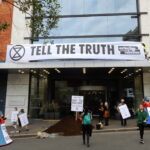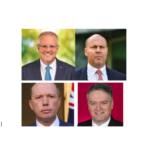Calls for a Murdoch Royal Commission: “A Cancer on Our Democracy”, Says Rudd

James Murdoch recently told the New York Times that the reason he resigned from the board of News Corp in July, is that his father’s newspaper publishing company is propagating and legitimising disinformation.
The younger son of Australian-born media mogul Rupert Murdoch, James outlined that while engaging in “a contest of ideas” might be a noble pursuit, it shouldn’t be a way to “hide agendas” or “legitimise” false information intended to mislead, implying that’s what News Corp is up to.
“I think at great news organizations, the mission really should be to introduce fact to disperse doubt – not to sow doubt, to obscure fact, if you will,” Murdoch told the NY Times’ Maureen Dowd.
And a few days later, Kevin Rudd was online pointing to the significance of what Rupert’s son had to say.
The former Australian prime minister drew attention specifically to the claim that the Murdoch Empire is engaged in “the legitimisation of disinformation”.
This admission by James Murdoch was especially pertinent to Rudd as the week prior he’d just launched a campaign calling on the federal government to hold a Royal Commission into “the abuse of media monopoly in Australia, and in particular by the Murdoch media”.
Safeguarding media diversity
The campaign revolves around an online petition calling for the official media inquiry. It will be presented to federal parliament on 5 November. As of Tuesday, over 340,000 people had signed the document, and it’s certain many more will do so prior to its tabling.
Rudd gives four reasons as to why something has to be done about the way News Corp is operating in this country. These include Murdoch owning “70 percent of our print readership”, and the sway he has over federal elections.
The next reason the former Labor leader gives is that Murdoch uses his vast ownership to “maximise his political power” to push agendas dear to him, such as climate denial.
And the last point Rudd makes is that those who stand up to Murdoch are subsequently bullied into submission.
As the petition notes, a “Royal Commission to ensure a strong, diverse Australian news media” would counter the threat posed to Australian democracy by concentrated media ownership and business models that “encourage deliberately polarising and politically manipulated news”.
The investigation would also scrutinise the mass sackings of journalists, digital platforms impacting on diversity, Nine’s takeover of the former Fairfax publications, the ongoing assault on the ABC, as well as News Corp’s acquisition and subsequent closure of more than 200 small papers.
Propagating base ideologies
The 2019/20 Black Summer bushfires saw 20 percent of mainland forest burn to the ground. And as scientists and fire chiefs pointed to changing climate as the cause of the unprecedented crisis, a triumvirate of profit-seeking entities did their best to stymie the awareness around this truth.
In cahoots with the Morrison government and the fossil fuel lobby, it was the third party, News Corp, that was able to conduct the farthest reaching information campaign aiming to place doubt in the minds of the general public around the bushfire crisis being climate-driven.
Greenpeace’s May 2020 Burnt Country report details that Murdoch’s company published 79 percent of articles denying a climate link to the bushfires, while it only published 46 percent of all articles on the fires and climate.
The report further outlines that “News Corp consistently produced more articles attributing the bushfires to a lack of hazard reduction burning and arson than other” media outlets, while the evidence pointed to lightning strikes and a dry landscape being the real source of the wildfires.
“This took place despite internal whistleblowers coming out against News Corp’s agenda,” the report authors note, “and public criticism of the company’s position on climate change by Rupert Murdoch’s son, James.”
The old colonial boy
Of course, Rupert has worked his way into his position of power over many decades.
As veteran journalist John Pilger has recalled, Murdoch backed Whitlam during the 1972 election. But when the new PM showed himself to be a “radical reformer”, the media boss waged such a biased campaign against him that journalists from The Australian burned the paper in the streets.
Pilger further posits that Murdoch’s most persistent campaign has been against First Nations peoples, pointing out that the Hawke government had pledged to legislate Aboriginal land rights. However, the Murdoch press reported on a lack of support, despite evidence to the contrary.
Indeed, following an outcry over the 1956 Grayden report, which exposed the shocking conditions Aboriginal people faced in the Warburton Ranges, a young Adelaide News editor, Rupert Murdoch, went to the region and reported back that the First Peoples had never “enjoyed better conditions”.
The broad reach of News Corp
Rudd’s petition was posted on the Australian parliament website on 10 October. The ex-prime minister later tweeted that the administrators of the site were concerned that robots might have been signing the document as it had garnered 38,000 signatures by the following morning.
However, it seems that federal Labor may not be supporting the petition. Labor leader Anthony Albanese said on 11 October that he hadn’t called for a Royal Commission, rather “Kevin is doing that as a private citizen”. And he added that he’s the one who announces Labor policy.
It might be remembered that in the leadup to the last federal election, at a time when it seemed almost certain that the opposition would win, Labor leader Bill Shorten refused to participate in the usual meet and greet with Rupert Murdoch prior to the vote.
Following this rebuff, Shorten was subjected to an attack from the Daily Telegraph over a heartfelt memory he’d shared of his late mother on TV. This criticism of the anecdote was likely driven by the fact that other media outlets were heralding it as the moment the election had been won.
These incidents raise a number of questions. Did refusing to meet with Murdoch contribute to Shorten’s downfall? Did the Daily Telegraph attack help shape the election outcome? And have these two events contributed to Albanese’s reluctance to support Rudd’s petition?
But in asking these questions, one thing is certain, that is a single media outlet holds a hell of a lot of power over fairly significant outcomes in this country.







